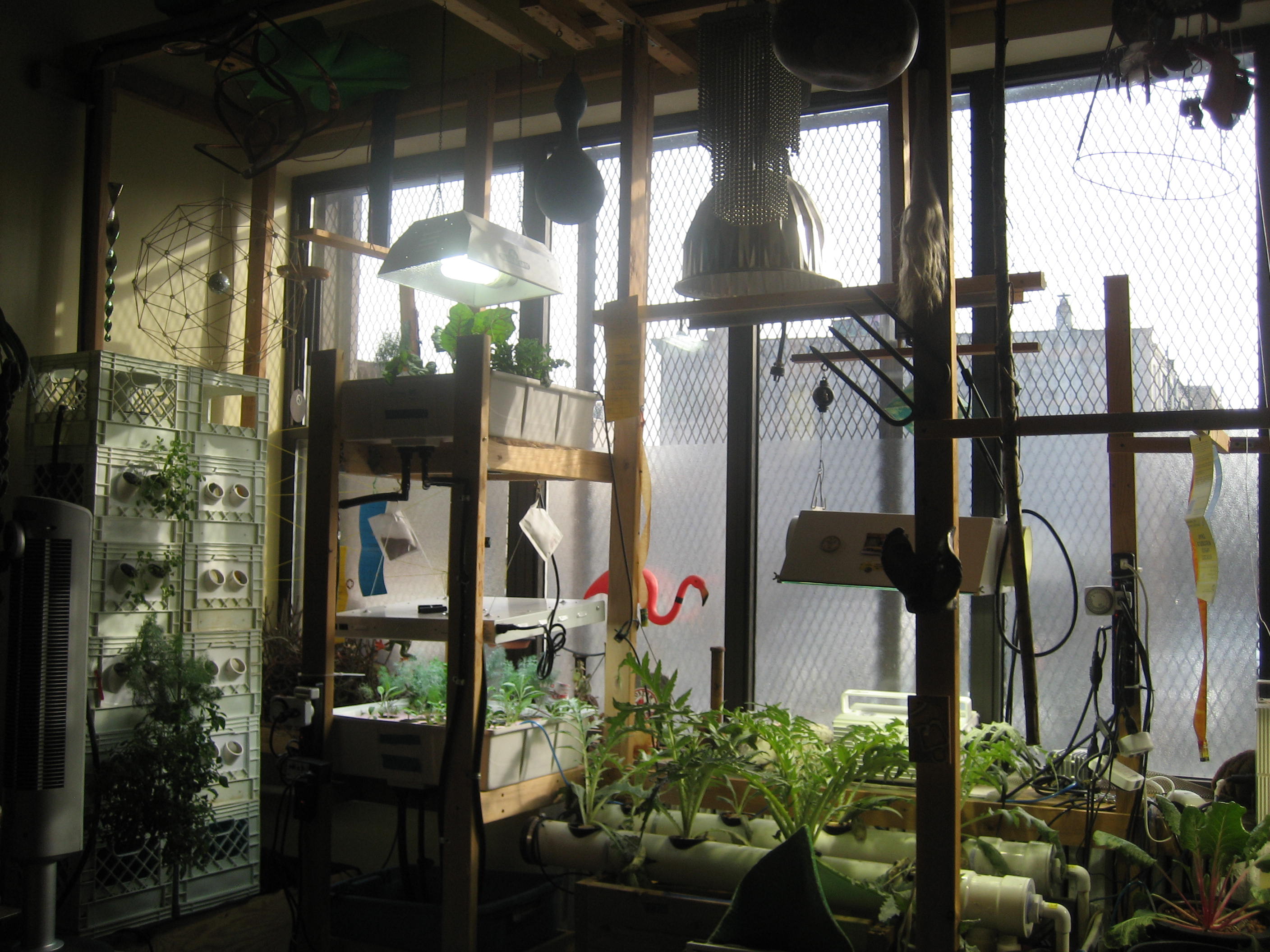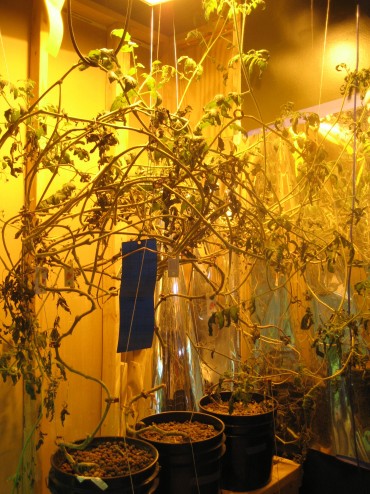boswyck farms
neighborhood: bushwick | space type: farm | active since: 2008 | links: website, facebook, twitter
Amid all the other creative movements in Brooklyn these days, farming is one that’s gaining ground. Brooklynites are farming in gardens (Trees Not Trash, Bushwick City Farm), on rooftops (Eagle Street, Roberta’s), even in trucks! And of course they’re experimenting with different kinds of farming—which brings us to Boswyck.
Boswyck Farms is a working hydroponic farm as well as a research and development center, focused on building and testing different types of hydroponic growing systems. They grow all manner of produce—from artichokes to dill to a dwarf apple tree—and they’ve placed smaller offshoot farms around the neighborhood, including on the roof of the Bushwick Starr. They also do a ton of outreach and projects within the community, like growing lettuce at an institution for adults with mental illness, teaching botany programs and summer school classes in NYC schools, and running hydroponic workshops for adults. They even bring students into the farm as interns. It’s not just for kids, of course—anyone can volunteer.
Q&A with Lee, Boswyck’s founder
brooklyn spaces: Give me a
quick hydroponics tutorial.
Lee: Hydroponics at its core is growing
without soil. All the food that the plants need is mixed into a nutrient
solution. We try out many of the different types of hydroponic systems here.
We’re growing tomatoes in a flood-and-drain system, and the way that works is
and six times a day the roots get bathed in nutrients, and then it drains back
down into the reservoir. All of our systems re-circulate. We have ancho peppers
growing in a drip system, where nutrients are dripped through the roots
continuously, twenty-four hours a day. We have an herb garden, with basil, dill,
cilantro, oregano, and thyme, growing in another flood-and-drain system. We have
several self-contained drip systems, growing broccoli, cauliflower, and pink
flamingo chard. We have artichokes growing in a deep-water system, which has
about two inches of nutrients that the roots sit in all the time, and a raft
system growing cucumbers, sage, dill, cilantro, and spinach. Lastly, we have
basil, dill, and cilantro growing in a tower system built out of milk crates.
Every nine minutes, the pump turns on and rains down nutrients through the
roots. That system was designed by two students at City College.
brooklyn spaces: And this is all great for the environment, right?
Lee: Even though it’s counterintuitive, hydroponics uses 70–90 percent less water than traditional growing: there’s no runoff, and there’s very little evaporation. People ask whether hydroponics uses a lot of electricity, and usually they look at the lights, which do use a lot, but they actually have nothing to do with hydroponics. If we were growing indoors with soil, the lights would be the same. At Boswyck, we’re starting to look at how we can offset some of the electricity usage with wind and solar power, and we’re always looking at ways to build these systems from reclaimed materials.
brooklyn spaces: Have you always been a
farmer?
Lee: No, I’m a computer programmer. I read
a magazine article and took a visit to the Science Barge, which is a teaching boat that’s
hydroponic, and I just got hooked. I decided that I was going to turn my life
upside-down and become an urban farmer. It’s very exciting and very terrifying,
because I’m putting my life savings into it. If I wasn’t frightened, I’d be
delusional.
brooklyn spaces: Who are some of your
clients?
Lee: One is a place called Fountain House, in
Hell’s Kitchen, which is a residency and day center for adults with mental
illness. They wanted to grow the lettuce that they use in their cafeteria, so
they had a 165-sq-ft room that we built out just for growing lettuce. Another
client is the Child Development
Support Corporation in Bed-Stuy. They do a lot of early childhood
classes for families, and they run an emergency food pantry. They gave us a
250-sq-ft room, and we’re going to be growing lettuce, bok choy, and collards.
brooklyn spaces: Tell me about the work you
do with students.
Lee: We started in a fourth-grade class in
the West Village. The last time I had been in a fourth-grade classroom, I was
in fourth grade. I had a lot of respect for teachers going in, but now
I simply don’t understand how they do it. I’d spend an hour and a half with the
kids and then come home and take a nap. Now we do informal internships with
college students and formal internships with some high school students in the
neighborhood. It’s been really eye-opening working with these kids. They have
been fucked by the system, from start to finish. I can’t put it any other way.
I’ve got eleventh graders in who are reading at a fourth- or fifth-grade level,
very little math skills, and nobody’s ever taught them a work ethic. I feel my
job is teaching them how to work, what it is to be in a workplace, and things
like personal responsibility. Not too long ago, we had a workshop with a number
of sixth-grade students from a school out in suburban Queens, and these kids
were so focused, the questions they came up with were so insightful. Seeing the
contrast between them and the kids we work with in at-risk areas… I always knew
this was going on, but it hit me really hard when I saw it in person. It makes
me want even more to bring that kind of experience to schools in our
neighborhood, because all kids deserve it.
brooklyn spaces: Are you the only hydroponic
farm in Brooklyn?
Lee: There aren’t a lot of legal
hydroponic farms in the New York City area. We don’t shy away from the fact that
most of the people doing hydroponics in the city are growing pot. In fact, the
pot growers are doing some great research, and we wouldn’t be where we are
without them. But there’s a number of different farms in the city that are doing
everything from small-scale to large commercial greenhouses. I think we’re the
only ones who combine hydroponics, education, and working with social service
providers. There is definitely a lot of great urban farming going on all over
New York, and Brooklyn seems to be the epicenter.
***
Like this? Read about more community groups: Trees Not Trash, Books Through Bars, Brooklyn Free Store, Trinity Project, Time’s Up, Film Biz Recycling, Bushwick City Farms







